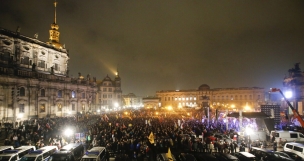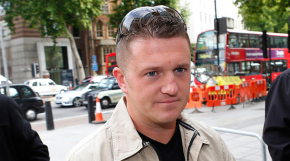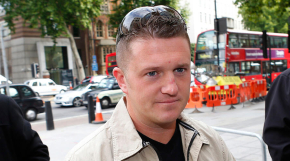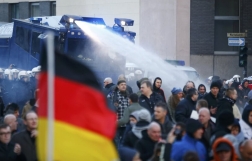On New Years Eve, dozens of women were attacked in Cologne. More than 500 criminal complaints have been filed, 40 per cent of them alleging sexual assault. An official report says that the suspected perpetrators are "almost exclusively" from a migrant or North African background. The city's police chief has been fired. North Rhine-Westphalia's interior minister Ralf Jäger is himself under pressure. Media outlets are accused of soft-pedalling the ethnic origins of the men in question because they don't want to look racist. We have even learned a new word: this semi-organised mass sexual harassment is a "taharrush" game, like what happened to women in Cairo's Tahrir Square during the uprising there.
The whole thing is a gift to the Pegida anti-immigration organisation that campaigns against Germany's policy of welcoming refugees from Muslim-majority countries. "See, we told you so," they're saying. "You can't trust them."
Well, can we?
To a degree, the "we" is redundant, since Britain has resolutely refused to take more than a few thousand refugees from the wars in Syria, Iraq and Afghanistan. The narrative, however, is very definitely ours. For some news outlets, the events in Cologne vindicate what they have been saying all along: that allowing large groups of young men into the country, uprooted from their own context, who do not understand Western cultural assumptions about women and probably don't care anyway, is a recipe for disaster.
While it is a propaganda gift for the right, it is an embarassment for the left. Pre-Cologne scaremongering allowed liberals to paint Pegida and its various counterparts around the continent as moral Neanderthals, Europe's Jim Crow tendency. These people are different. They don't share our values. They're coming for Our Women.
The result is a situation that is very dangerous for social cohesion, democracy and the sense of human solidarity that's so necessary at this time.
It makes it much harder for refugees to be accepted into their host communities because it provokes suspicion and distrust.
It puts democracy under strain because the democratic institutions that ought to have protected the women of Cologne – the police, the policies that allowed these migrants in to the country in the first place – failed to do so.
This makes people think, when they are asked to sympathise with people from Syria or Iraq, "Why should we? We've seen what happens when they come here."
What words, then, should the Church speak into such a situation? The danger is that it falls into the trap of urging compassion and understanding for the wrong people, because it instinctively resists joining the universal condemnation of the perpetrators and hates the idea of lining up alongside the bigots of Pegida. However:
1. First, it can say that violence against women is never right. If the culture of the perpetrators has allowed young men to believe that this sort of behaviour is acceptable, it needs to be challenged and rejected outright.
2. Second, it can call for the guilty to be found and punished. There should be no suggestion that they are somehow less guilty because they have not been taught to respect the independence and free choices of women.
These are absolute values: women should be safe and they should be free from men's control. Understanding and accepting this is part of the duty the guest owes the host.
However, though condemnation is sometimes necessary, for the Church it is never enough. It must also speak with grace and understanding. So it must ask why these men felt that they could behave in this way, in order to be able to challenge them effectively. At the root of the Cologne attacks is rage born out of powerlessness, poverty and fear. And while it would be wrong to deny that some contexts – social and religious – are more fertile ground for violence than others, these are at the roots of a great deal of violence against women in "enlightened" Western countries as well as others.
In her shocking and moving book Scars Across Humanity about violence against women, Elaine Storkey argues that women are targeted because they are likely to be more vulnerable. They are abused because it's easier. She refers to warped power relationships and the deeply entrenched structural inequalities between the sexes. Patriarchy, she says, is "pathological", concluding: "If women and men are ever to flourish in a context of mutual, free justice and empowerment we must travel beyond patriarchy into a new social order."
We are, globally, making progress on the treatment of women. But it's uneven. What happened in Cologne was an irruption, into a society that had become complacent, of a different set of values altogether. Those ideas need to be defeated. But the psychological and emotional drivers behind them need to be understood and tackled as well. The swamp has to be drained.
It's hard to ask the people of Cologne to understand, to forgive and to join in the work of healing. But as Pope Francis has said, the name of God is mercy: he is the one who "welcomes, embraces, and transfigures evil into good, transforming and redeeming my sin, transmuting condemnation into salvation".
Follow RevMarkWoods on Twitter.

















